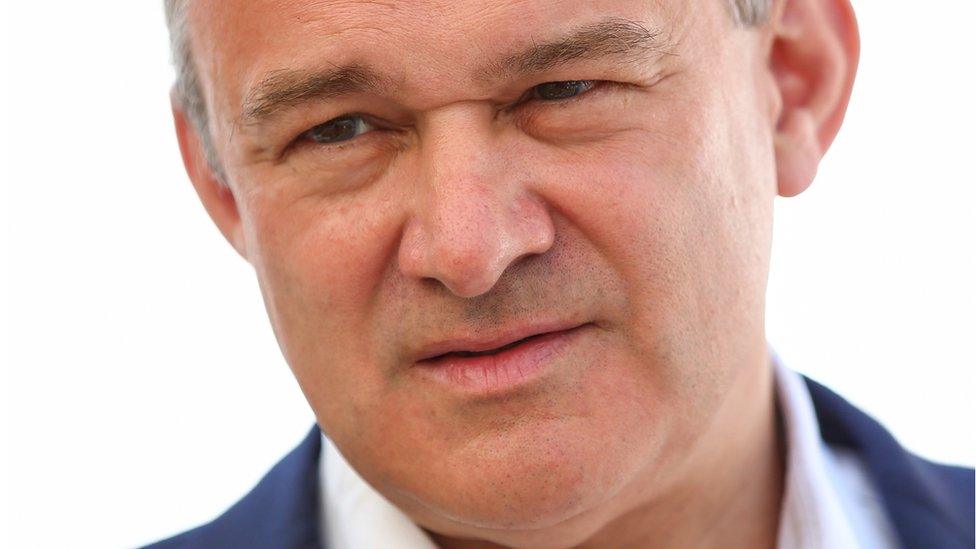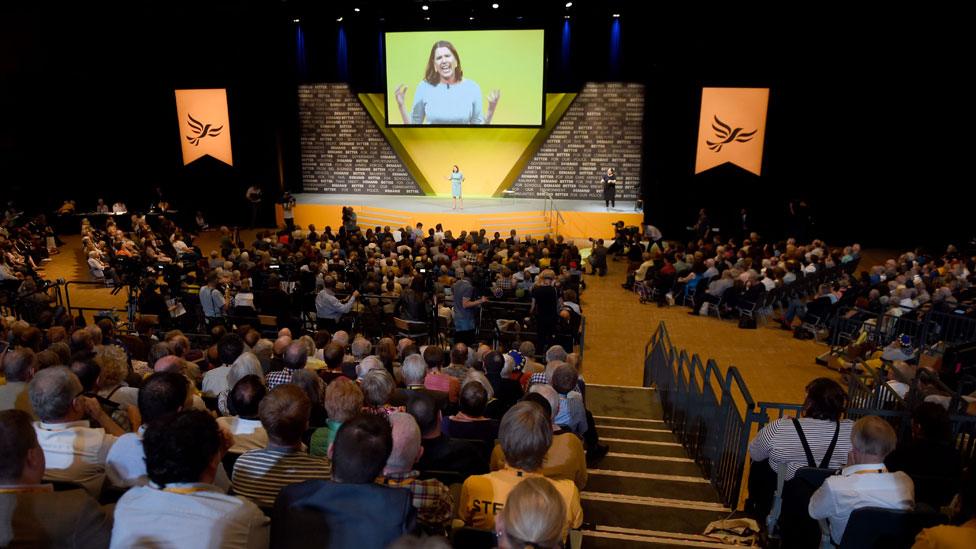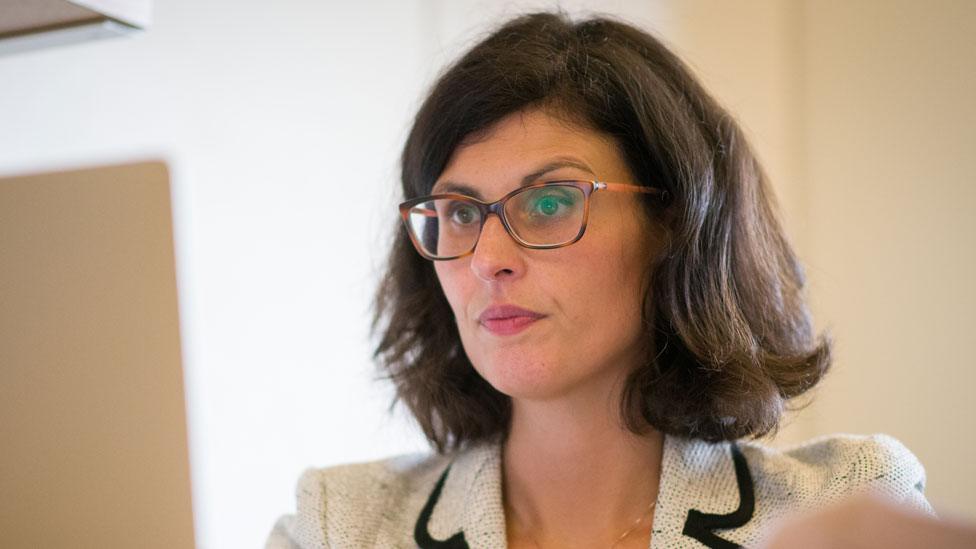Lib Dem conference: Sir Ed Davey gambles on targeting Tories
- Published

"What do the Liberal Democrats stand for?"
That - according to one senior Lib Dem MP - is the question the party needs to answer this weekend, at its annual conference.
The pandemic has made it harder for a party which can struggle to get itself heard at the best of times to rebuild support after its devastating result in the 2019 general election.
In place of the usual grand gathering, the Lib Dems are holding their conference online, which may not help them in their efforts to win over wavering Conservatives unhappy with Boris Johnson's government.
There will be no chance for members to raise a glass to tentatively encouraging poll ratings - or for party leader Sir Ed Davey to see a hall full of activists rise to its feet in support.
The leader will have an audience of about 100, at a venue in London's Canary Wharf, for his online speech on Sunday afternoon.
Other leading lights are pre-recording their speeches, without an audience.
"It's not ideal," said Alistair Carmichael, the party's home affairs spokesman, ahead of his speech on Friday.
But the hope among members as they gather virtually at their laptops and prepare for debates via video link, is that the victory against the Tories in the Chesham and Amersham by-election can boost the party's appeal and credibility before voters next go to the polls.
'Punch above our weight'
"We're always on an election footing," said Lib Dem chief whip Wendy Chamberlain, MP for North East Fife as the conference began.
Asked about her party's expectations for success though, there is a marked contrast to the brazen optimism of former leader Jo Swinson's pitch to be prime minister in 2019.

Jo Swinson addresses a packed hall at the 2019 Lib Dem conference
"We're being realistic, we're currently the fourth party in Westminster," she says, but insists the 12 Lib Dem MPs "punch above our weight."
Nevertheless, just over a year into his time as leader, Sir Ed Davey has seized on the Chesham and Amersham by-election win as a blueprint for success.
Under him the party is eyeing with laser-like focus the so-called Blue Wall of Conservative seats, largely in the south of England, where the Lib Dems have significant support and feel voters are turning against Boris Johnson's government.
But some in the party's grassroots are wary of limiting the Lib Dems' appeal.
"We can't just be a party of the affluent south and Scotland," warns John Potter, a Lib Dem councillor in Lancashire.
He suggests the party has an opportunity to set itself apart from Labour, too, particularly in areas where the Lib Dems have a presence in local government if not at Westminster.
"Labour are going through a whole change - we know who we are as the Lib Dems, and can be a good alternative."
Policy offers
But aside from positioning themselves as credible alternatives for Conservatives uneasy with the prime minister's priorities, when it comes to policy what more might the Liberal Democrats be able to offer?
There will be a focus on carers, working parents, small businesses and the self-employed in Sir Ed Davey's speech.
Lumped together as those who feel "left behind" or "let down" by the Conservatives, there are clear groups of voters the party is keen to attract.

Layla Moran wants Sir Ed to set out a vision for the party
A rumoured announcement on education may be the most significant new policy Sir Ed Davey offers.
Some are hoping for a totemic policy which can define the Liberal Democrats in the way an income tax rise to pay for investment in education did under Lord Ashdown in the 1990s.
But although the Lib Dems are opposed to a rise in National Insurance contributions, the government's move to tackle social care with a significant tax rise may limit Sir Ed's hopes to champion that issue.
On housing planning reform, another area where the party sees potential to win support, the pausing of government plans may make it harder for the Lib Dems to cut through.
Need for vision?
But Layla Moran, MP for Oxford West and Abingdon, who ran against Sir Ed for the party leadership, says her former opponent must focus on the big picture.
"What I and others are looking for… is the broader brush vision stuff we haven't seen yet."
"That is the more important part for Ed to land," she said, which could serve as a reminder to the party leadership that it has yet to prove itself in the eyes of some.
Others agree that now is not the moment to be publishing a draft election manifesto.
"It's not sensible to be trying to work out a detailed policy when you still don't know the challenge we'll be facing post-Covid," one MP said.
"Vote for us, we're not the Conservatives" might be over-simplifying the Lib Dems position, but perhaps not by much.
There is a belief all-round in the party that attracting disaffected tory supporters or "soft-con switchers" to use one strategist's jargon is their best hope at the next election, whenever it comes.
The conference will provide a forum serious policy discussions on topics from gay conversion therapy to global corporation tax.
But the party, badly wounded by such a devastating result at the 2019 general election, is at least allowing itself an opportunity to celebrate its recent success.
As one senior party figure put it: "The mood is buoyant, which isn't always the case."
One by-election win may not provide the Lib Dems with a route back from the margins of UK politics on it's own.
But they are banking on it being the first step.